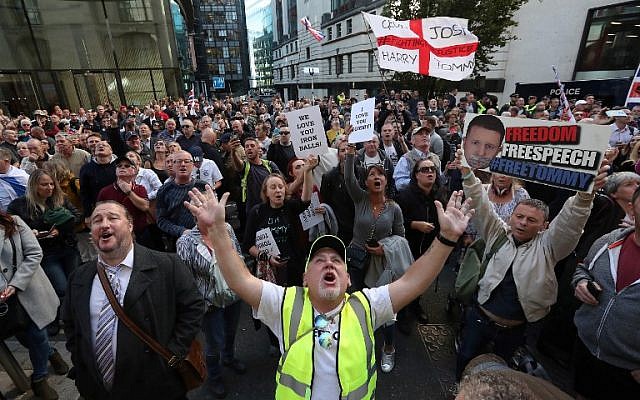A rally in support of UK far-right activist Tommy Robinson, September 27, 2018
The UK Government is finally acknowledging the threat of far-right “terrorism”.
Up to now, those arrested on terror-related charges have predominantly been considered individuals who are “not white” and often Muslim. But the Home Office has now released official statistics challenging this impression.
The report finds that of those arrested on terror-related charges, 38% are white while 37% are those of an Asian appearance: “This was the first time, since the year ending June 2005, that the proportion of white people arrested has exceeded the proportion of Asian people arrested.”
The report goes farther in considering ideology. There are a variety of themes in the “far right”, such as anti-communism, neo-fascism, neo-Nazism, racism, xenophobia, and opposition to immigration. The Home Office recognizes this but draws the overriding conclusion, “The proportion of prisoners holding far-right ideologies has increased steadily over the past three years, with the number up from 10 to 28 in the latest year.”
This far-right extremism has been part of headline incidents. In 2016, member of Parliament Jo Cox was murdered by Thomas Mair. A police raid of Mair’s residence found symbols such as a gold Third Reich eagle ornament with an emblazoned swastika. Last year Darren Osborne drove from Cardiff to North London and mowed down more than 10 worshippers exiting the Finsbury Mosque.
Addressing the Causes
Under the Terrorism Act 2000, the UK Government banned National Action, the first such action against a far-right group since World War II. But it is only recently that Mark Rowley, the former Assistant Commissioner of London, claimed that “the Far-Right terrorist threat is more significant and more challenging than perhaps public debate gives it credit for”.
And while individuals are now calling out far-right activities, addressing the causes poses a challenge. One reason for the surge of far-right extremism is the growth of ethno-nationalism. The debate before and after the Brexit referendum of 2016 was bound up with that nationalism around a “British identity”, used to challenge membership of the European Union and specific issues such as the free movement of EU citizens.
Resentment of immigration and the supposed erosion of the British Identity has aligned with the ideology that motivates far-right organisations. It has also accompanied a sharp rise in hate crimes against minorities: in the three months after the referendum, the Home Office released statistics that showed hate crimes rising by 50%.
As with the rise of far-right extremist groups across European states, those in the UK have also fed off the growth of refugee crises, notably the forced exodus of civilians from the 91-month conflict in Syria. The far group portrayed the movement as a Muslim invasion of Europe, threatening identity and cultural heritage.
Dealing With “Reciprocal Radicalization”
For experts in counter-terrorism, including senior police officers, there is “reciprocal radicalization”. The increased frequency of Islamist attacks spurs individuals into far-right extremism, an effect bolstered by propaganda at the expense of all Muslims. The ensuing Islamophobia then contributes to the radicalization of some Muslims into Islamist extremism.
One senior police officer told me of the serious concern for security agencies that there are no means to halt this process. The benefits of living in a society with free expression and freedom of the press brings the difficulty of combating reciprocal radicalization.
But if the open nature of our society enables the growth of extremist groups, it also gives us the ability to frustrate this growth. There are community-based and structural approaches that, by engaging in positive dialogue, can challenge these ideologies. If the community can show that extremist views are not in-line with society — and thus “identity” — then radicalization can be turned into de-radicalization. Structural changes can play their part by safeguarding economic growth for all, reducing the appeal of extremist groups.
However, these approaches take time and organization, amid a time of uncertainty over frontline matters such as Brexit. So if the UK services have recognized the threat of far right extremism, are they — and the rest of us — preparted for the challenge beyond recognition.

